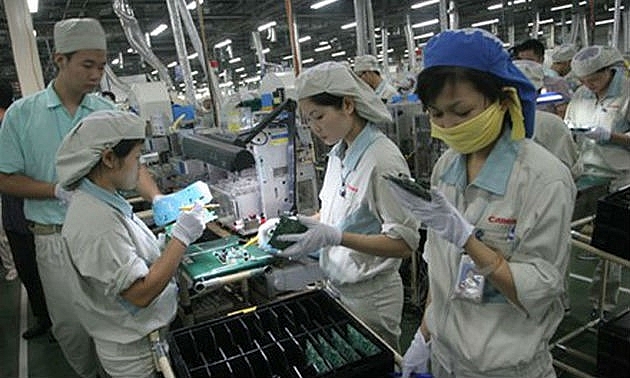JCCI proposes increasing overtime to 300 hours
 |
| JCCI argues overtime in Vietnam is far lower than the rest of the ASEAN |
In its proposal submitted to the Vietnam Chamber of Commerce and Industry (VCCI), JCCI mentioned that maximum overtime should be extended to 300 hours a year for normal jobs. In a number of special cases, the statutory limit on overtime would be increased to 400-500 hours arranged on a volunteer, not a compulsory, basis.
In case the policymaker decides to keep the ceiling at 400 extra working hours for special cases (as is proposed in the current draft), the JCCI proposed changing the job “Manufacturing products for export in the sectors of textile and garment, leather, shoes, electrical and electronic components, processing agricultural, forestry, and aquatic products” into “Manufacturing products for export in the sectors of textile and garment, leather, shoes, electricity, electronics, manufacturing supporting components for the above products, processing agricultural, forestry, and aquatic products.”
The JCCI mentioned that the overtime limit in Vietnam is much lower than in other countries in the ASEAN region. Notably, Vietnamese regulations set a limit of 200 hours per year, while the figure is 1,836 hours in Thailand, 1,248 hours in Malaysia, 1,224 hours in the Philippines, and 714 hours in Indonesia.
There are numerous countries in between Vietnam and its ASEAN counterparts, including China (423 hours), Bangladesh (408 hours), and India (300 hours).
“The large gap in overtime will impact the competitive capacity of the Vietnamese labour market compared to other countries,” said the JCCI.
The JCCI also added that its proposals were built after collecting opinions from numerous Japanese enterprises, including Canon, Panasonic, Toyota, and Denso.
The draft Labour Law is being reviewed by relevant stakeholders to be submitted to the National Assembly for approval in October 2019.
Fisheries enterprises proposed keeping the working hours unchanged. According to the Vietnam Association of Seafood Exporters and Producers (VASEP), the reduction of extra hours while enterprises are facing many difficulties will increase the burden and impact on enterprises and the economy.
Foreign enterprises are concerned about high increases in labour costs in Vietnam after the regulations reducing working hours are issued, especially when Vietnam's social insurance premiums are at a high level in the region and Vietnam’s minimum regional wage has increased steadily over the years.
What the stars mean:
★ Poor ★ ★ Promising ★★★ Good ★★★★ Very good ★★★★★ Exceptional
 Tag:
Tag:
Related Contents
Latest News
More News
- Hermes joins Long Thanh cargo terminal development (February 04, 2026 | 15:59)
- SCG enhances production and distribution in Vietnam (February 04, 2026 | 08:00)
- UNIVACCO strengthens Asia expansion with Vietnam facility (February 03, 2026 | 08:00)
- Cai Mep Ha Port project wins approval with $1.95bn investment (February 02, 2026 | 16:17)
- Repositioning Vietnam in Asia’s manufacturing race (February 02, 2026 | 16:00)
- Manufacturing growth remains solid in early 2026 (February 02, 2026 | 15:28)
- Navigating venture capital trends across the continent (February 02, 2026 | 14:00)
- Motivations to achieve high growth (February 02, 2026 | 11:00)
- Capacity and regulations among British areas of expertise in IFCs (February 02, 2026 | 09:09)
- Transition underway in German investment across Vietnam (February 02, 2026 | 08:00)

























 Mobile Version
Mobile Version